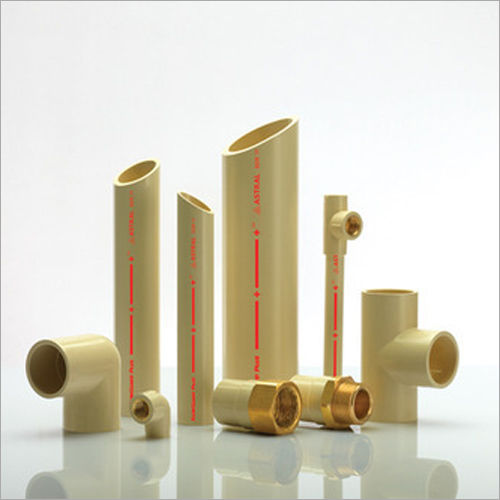Manufacturer, Trader, Wholesaler & Supplier

CPVC Pipes
2 INR/Kilograms
Product Details:
- Application Fluid Pipe
- Product Type Other
- Type Other
- Shape Round
- Connection Male
- Color White
- Click to view more
X
CPVC Pipes Price And Quantity
- 2 INR/Kilograms
- 200 Kilograms
CPVC Pipes Product Specifications
- White
- Other
- Male
- Other
- Fluid Pipe
- Round
CPVC Pipes Trade Information
- Cash in Advance (CID) Cheque Cash Advance (CA)
- 1 Kilograms Per Day
- 1 Days
- All India
Product Description
CPVC (Chlorinated Polyvinyl Chloride) pipes are a type of thermoplastic piping material known for its high temperature and chemical resistance. They are widely used in both residential and commercial plumbing systems for transporting hot and cold water. CPVC pipes are a reliable and cost-effective alternative to traditional metal pipes like copper and galvanized steel. They are easy to install, lightweight, and have a long service life, making them a popular choice for various plumbing applications.
Frequently Asked Questions (FAQ):
Q:What is CPVC?
A: CPVC stands for Chlorinated Polyvinyl Chloride, which is a type of plastic material created by chlorinating PVC resin. The chlorination process enhances the material's heat and chemical resistance, making it suitable for hot water applications.
Q: What are the advantages of using CPVC pipes?
A: CPVC pipes have several advantages, including high temperature resistance, corrosion resistance, low thermal conductivity, smooth inner surface (minimizing friction losses), easy installation (using solvent cement), and long-lasting performance.
Q: Are CPVC pipes safe for drinking water?
A: Yes, CPVC pipes are safe for carrying drinking water. They meet the necessary safety standards and regulations, and the chlorination process ensures they are suitable for potable water applications.
Q: Can CPVC pipes be used for both hot and cold water systems?
A: Yes, CPVC pipes are suitable for both hot and cold water systems. They can withstand high temperatures and maintain their structural integrity, making them ideal for a wide range of water supply applications.
Q: Can CPVC pipes be used for industrial applications?
A: CPVC pipes' chemical resistance and ability to handle elevated temperatures make them suitable for certain industrial applications, such as transporting corrosive fluids and hot liquids in chemical processing plants.
Enter Buying Requirement Details


